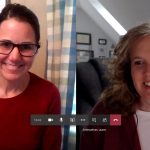University of Connecticut psychology professor James C. Kaufman, an expert in creativity research, in a Psychology Today post, sees people sheltering in place exhibiting “an increase in everyday creativity.” Although he lists a hierarchy of creative achievements, from “the family singing a song from ‘Les Miserables’” to publishing a “book about kiwi cultivation,…it is important not to let such a comparison diminish their value.”
Juanyi Li’s parents planned to fly from their hometown of Kunming, China, to Connecticut to watch her graduate. They had never been to campus and Li was eager to show them what life is like on an American college campus. “They made plans, but they had to cancel them,” Li said. “I started to plan my graduation a year ago. But it’s all canceled now.”
With school closures announced across the country, Neag School faculty, alumni, and students share resources and expertise on teaching, learning, homeschooling, and parenting during the pandemic.
“We all are learning to adapt, but, this is not what we asked for, and we do not plan to continue when it is no longer required,” writes Tamika La Salle, an associate professor of school psychology at the University of Connecticut’s Neag School of Education and a research scientist at its Center for Behavioral Educational Research.
The University had originally planned to conduct remote learning for two weeks following spring break, but growing health concerns led to a fully online transition for the Spring 2020 semester. UConn faculty members, some of whom had never administered remote courses before, had to transition their coursework quickly to align with the new remote teaching style. Neag School alumna Karen Skudlarek ’88 (BUS), ’16 MA and her colleagues at CETL have been instrumental in the process.
“As parents and other guardians get ready to prepare their teens for college, they should not neglect helping those new college students in terms of their overall well-being. Well-being is influenced by lots of factors, so an important part of supporting your wellness is to create a personal plan of action,” says Sandra Chafouleas a professor of Educational Psychology at the Neag School of Education.
With school closings, parents will have to continue to try to fill the void at home. For some, that seems nearly impossible. We speak with Jennie Weiner, a Somerville parent who recently wrote about these challenges for the New York Times.
“Thank you to those out there who are working diligently to help put an end to this pandemic. And thank you to those out there who are staying committed and putting forth effort to stay home,” says Neag School graduate student Montara Tomasetti. “You are making a bigger difference in this world than you may realize. You are appreciated, you are loved, and you are not alone in this.”
“This is one more vivid example of how the playing field is not level,” said Richard Schwab, a professor in educational leadership at UConn’s Neag School of Education and the former dean of the school. “Zip code is determining your education, not only in schools but online and I don’t think this is going away.”
“My kids are watching TV, playing video games and eating cookies,” says Jennie Weiner, a professor of educational leadership at the Neag School of Education and mother of two boys. “It’s fine.”


